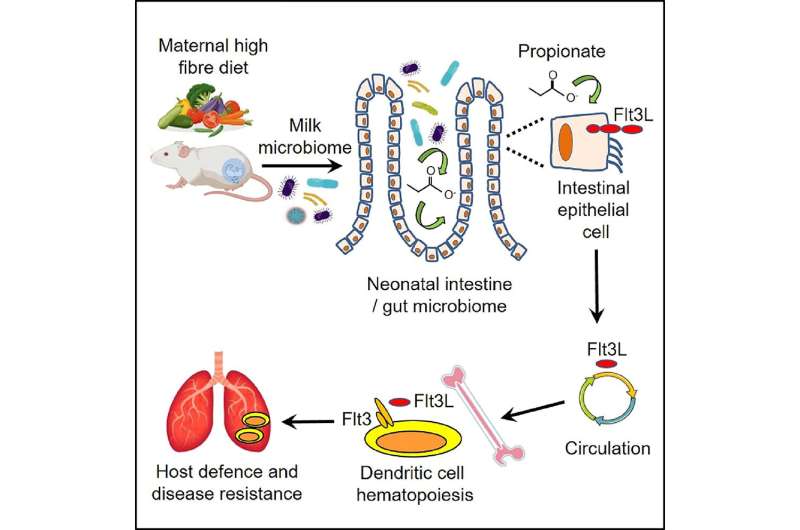This article has been reviewed according to Science X's editorial process and policies. Editors have highlighted the following attributes while ensuring the content's credibility:
fact-checked
peer-reviewed publication
proofread
Study shows maternal diet could reduce childhood asthma risk

New research from QIMR Berghofer has shown that a high-fiber diet in breastfeeding mothers could potentially protect infants from serious respiratory conditions such as asthma.
In a preclinical study published in Immunity, researchers demonstrated that a diet rich in fiber helped reduce the risk of babies developing severe lower respiratory infections (sLRIs), which can predispose the infant to chronic lung diseases.
The early results could lead to improved guidance for breastfeeding mothers, along with modifying baby formula to have a similar protective effect.
Senior researcher, Associate Professor Simon Phipps said the study's finding was significant because it suggested diet affected the health of a mother's breastmilk, which was key to triggering a baby's immune resistance to sLRIs.
"Poor maternal diet increases the incidence of severe lower respiratory infections, such as pneumonia and bronchiolitis, in an infant. These infections are a major cause of infant morbidity worldwide, and increase childhood asthma risk," said Phipps.
"In preclinical models, we found that dietary fiber affects the composition of the mother's milk microbiota, which in turn affects the development of the infant's gut microbiota.
"When a breastfeeding mother eats a high-fiber diet, her healthy milk microbiota kicks off a process that promotes the development of an important population of immune cells. We have identified that the microbes talk to the cells that line the gut, and these cells then produce a growth factor that supports the immune cells in the bone marrow. These immune cells then protect the infant against severe lower respiratory infections.
"A low-fiber maternal diet disrupts this process of immune development."
The study forms part of the ongoing effort by Phipps's laboratory to understand the mechanisms linking maternal diet, breastfeeding, and the microbiome to neonatal immune development and protection against acute and chronic diseases.
He said the findings suggest researchers may be able to prevent asthma if they can identify the healthy breastmilk microbes that trigger an infant's immune resistance to sLRIs.
"Our data indicates that if we can promote a healthy gut in the very young, we will prevent asthma and various other chronic inflammatory diseases," he said.
"However, the research still has a very long way to go. We are presently examining human milk to identify the microbes that confer protection against a severe lower respiratory infection and to confirm that the same molecular processes are involved.
"The end result could be a targeted probiotic, which may be provided to all infants, and in particular those who are being fed baby formula, to ensure optimal development of the infant's immune system and to lower the incidence of various diseases."
More information: Md. Al Amin Sikder et al, Maternal diet modulates the infant microbiome and intestinal Flt3L necessary for dendritic cell development and immunity to respiratory infection, Immunity (2023). DOI: 10.1016/j.immuni.2023.03.002

















